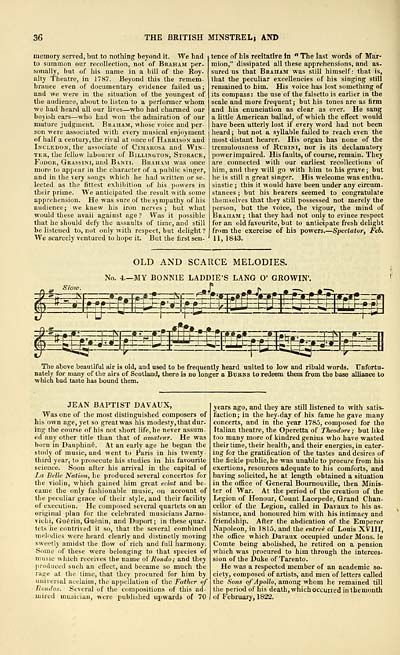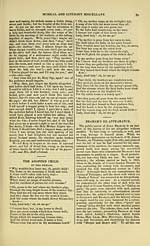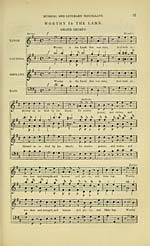Glen Collection of printed music > Printed music > British minstrel, and musical and literary miscellany
(374) Page 36 - My bonnie laddie's lang o' growin'
Download files
Complete book:
Individual page:
Thumbnail gallery: Grid view | List view

36
THE BRITISH MINSTREL, AND
memory served, but to nothing beyond it. We had
to summon our recollection, not of Braham per-
sonally, but of his name in a bill of the Roy.
alty Theatre, in 1787. Beyond this the remem-
brance even of documentary evidence failed us ;
and we were in the situation of the youngest of
the audience, about to listen to a performer whom
we had heard all our lives — who had charmed our
boyish ears — who had won the admiration of our
mature judgment. Braham, whose voice and per-
son were associated with every musical enjoyment
of half a century, the rival at once of Harbison and
Incledon, the associate of Cimarosa and Win-
ter, the fellow labourer of Billington, Storage,
FoDOR, Grassini, and Banti. Braham was once
more to appear in the character of a public singer,
and in the very songs which he had written or se-
lected as the fittest exhibition of his powers in
their prime. We anticipated the result with some
apprehension. He was sure of the sympathy of his
audience; we knew his iron nerves; but what
would these avail against age? Was it possible
that he should defy the assaults of time, and still
be listened to, not only with respect, but delight ?
We scarcely ventured to hope it. But the first sen-
tence of his recitative In " The last words of Mar-
mion," dissipated all these apprehensions, and as-
sured us that Braham was still himself: that is,
that the peculiar excellencies of his singing still
remained to him. His voice has lost something of
its compass : the use of the falsetto is earlier in the
scale and more frequent; but his tones are as firm
and his enunciation as clear as ever. He sang
a little American ballad, of which the effect would
have been utterly lost if every word had not been
heard ; but not a syllable failed to reach even the
most distant hearer. His organ has none of the
tremulousness of Rcbini, nor is its declamatory
powerimpaired. His faults, of course, remain. They
are connected with our earliest recollections of
him, and they will go with him to his grave ; but
he is still a great singer. His welcome was enthu-
siastic ; this it would have been under any circum-
stances ; but his hearers seemed to congratulate
themselves that they still possessed not merely the
person, but the voice, the vigour, the mind of
Braham ; that they had not only to evince respect
for an old favourite, but to anticipate fresh delight
from the exercise of his powers. — Spectator, Feb.
11, 1843.
Slow.
OLD AND SCARCE MELODIES.
No. 4.— BIY BONNIE LADDIE'S LANG O' GROWIN'.
=*^^t=f:«:i3i:
gfS g ^^E^Ps^ggg^IB
The above beautiful air is old, and used to be frequently heard united to low and ribald words. Unfortu-
nately for many of the airs of Scotland, there is no longer a Bubns to redeem them from the base alliance to
which bad taste has bound them.
JEAN BAPTIST DAVAUX,
Was one of the most distinguished composers of
his own age, yet so great was his modesty, that dur-
ing the course of his not short life, he never assum-
ed any other title than that of amateur. He was
born in Dauphin^. At an early age he began the
study of music, and went to Paris in his twenty-
third year, to prosecute his studies in his favourite
science. Soon after his arrival in the capital of
La Belle Nation, he produced several concertos for
the violiu, which gained him great eelat and be-
came the only fashionable music, on account of
the peculiar grace of their style, and their facility
of execution. He composed several quartets on an
original plan for the celebrated musicians Jarno-
vichi, Gu^rin,Gu6nin, and Duport; in these quar-
tets he contrived it so, that the several combined
melodies were heard clearly and distinctly moving
sweetly amidst the flow of rich and full harmony.
Some of these were belonging to that species of
music which receives the name of Rondo; and they
]iroduccd such an efiect, and became so much the
rage at the time, that they procured for him by
universal acclaim, the appellation of the Father of
Rondos. Several of the compositions of this ad-
mired musician, were published upwards of 70
years ago, and they are still listened to with satis-
faction; in the hey-day of his fame he gave many
concerts, and in the year 1785, composed for the
Italian theatre, the Operetta of Theodore; but like
too many more of kindred genius who have wasted
their time, their health, and their energies, in cater-
ing for the gratification of the tastes and desires of
the fickle public, he was unable to procure from his
exertions, resources adequate to his comforts, and
having solicited, he at length obtained a situation
in the oflice of General Bournonville, then Minis-
ter of War. At the period of the creation of the
Legion of Honour, Count Lacepede, Grand Chan-
cellor of the Legion, called in Davaux to his as-
sistance, and honoured him with his intimacy and
friendship. After the abdication of the Emperor
Napoleon, in 1815, and the entree of Louis XVIII,
the office which Davaux occupied under Mons. le
Comte being abolished, he retired on a pension
which was procured to him through the interces-
sion of the Duke of Tarento.
He was a respected member of an academic so-
ciety, composed of artists, and men of letters called
the Sons of Apollo, among whom he remained till
the period of his death, which occurred in themonth
of February, 1822.
THE BRITISH MINSTREL, AND
memory served, but to nothing beyond it. We had
to summon our recollection, not of Braham per-
sonally, but of his name in a bill of the Roy.
alty Theatre, in 1787. Beyond this the remem-
brance even of documentary evidence failed us ;
and we were in the situation of the youngest of
the audience, about to listen to a performer whom
we had heard all our lives — who had charmed our
boyish ears — who had won the admiration of our
mature judgment. Braham, whose voice and per-
son were associated with every musical enjoyment
of half a century, the rival at once of Harbison and
Incledon, the associate of Cimarosa and Win-
ter, the fellow labourer of Billington, Storage,
FoDOR, Grassini, and Banti. Braham was once
more to appear in the character of a public singer,
and in the very songs which he had written or se-
lected as the fittest exhibition of his powers in
their prime. We anticipated the result with some
apprehension. He was sure of the sympathy of his
audience; we knew his iron nerves; but what
would these avail against age? Was it possible
that he should defy the assaults of time, and still
be listened to, not only with respect, but delight ?
We scarcely ventured to hope it. But the first sen-
tence of his recitative In " The last words of Mar-
mion," dissipated all these apprehensions, and as-
sured us that Braham was still himself: that is,
that the peculiar excellencies of his singing still
remained to him. His voice has lost something of
its compass : the use of the falsetto is earlier in the
scale and more frequent; but his tones are as firm
and his enunciation as clear as ever. He sang
a little American ballad, of which the effect would
have been utterly lost if every word had not been
heard ; but not a syllable failed to reach even the
most distant hearer. His organ has none of the
tremulousness of Rcbini, nor is its declamatory
powerimpaired. His faults, of course, remain. They
are connected with our earliest recollections of
him, and they will go with him to his grave ; but
he is still a great singer. His welcome was enthu-
siastic ; this it would have been under any circum-
stances ; but his hearers seemed to congratulate
themselves that they still possessed not merely the
person, but the voice, the vigour, the mind of
Braham ; that they had not only to evince respect
for an old favourite, but to anticipate fresh delight
from the exercise of his powers. — Spectator, Feb.
11, 1843.
Slow.
OLD AND SCARCE MELODIES.
No. 4.— BIY BONNIE LADDIE'S LANG O' GROWIN'.
=*^^t=f:«:i3i:
gfS g ^^E^Ps^ggg^IB
The above beautiful air is old, and used to be frequently heard united to low and ribald words. Unfortu-
nately for many of the airs of Scotland, there is no longer a Bubns to redeem them from the base alliance to
which bad taste has bound them.
JEAN BAPTIST DAVAUX,
Was one of the most distinguished composers of
his own age, yet so great was his modesty, that dur-
ing the course of his not short life, he never assum-
ed any other title than that of amateur. He was
born in Dauphin^. At an early age he began the
study of music, and went to Paris in his twenty-
third year, to prosecute his studies in his favourite
science. Soon after his arrival in the capital of
La Belle Nation, he produced several concertos for
the violiu, which gained him great eelat and be-
came the only fashionable music, on account of
the peculiar grace of their style, and their facility
of execution. He composed several quartets on an
original plan for the celebrated musicians Jarno-
vichi, Gu^rin,Gu6nin, and Duport; in these quar-
tets he contrived it so, that the several combined
melodies were heard clearly and distinctly moving
sweetly amidst the flow of rich and full harmony.
Some of these were belonging to that species of
music which receives the name of Rondo; and they
]iroduccd such an efiect, and became so much the
rage at the time, that they procured for him by
universal acclaim, the appellation of the Father of
Rondos. Several of the compositions of this ad-
mired musician, were published upwards of 70
years ago, and they are still listened to with satis-
faction; in the hey-day of his fame he gave many
concerts, and in the year 1785, composed for the
Italian theatre, the Operetta of Theodore; but like
too many more of kindred genius who have wasted
their time, their health, and their energies, in cater-
ing for the gratification of the tastes and desires of
the fickle public, he was unable to procure from his
exertions, resources adequate to his comforts, and
having solicited, he at length obtained a situation
in the oflice of General Bournonville, then Minis-
ter of War. At the period of the creation of the
Legion of Honour, Count Lacepede, Grand Chan-
cellor of the Legion, called in Davaux to his as-
sistance, and honoured him with his intimacy and
friendship. After the abdication of the Emperor
Napoleon, in 1815, and the entree of Louis XVIII,
the office which Davaux occupied under Mons. le
Comte being abolished, he retired on a pension
which was procured to him through the interces-
sion of the Duke of Tarento.
He was a respected member of an academic so-
ciety, composed of artists, and men of letters called
the Sons of Apollo, among whom he remained till
the period of his death, which occurred in themonth
of February, 1822.
Set display mode to: Large image | Transcription
Images and transcriptions on this page, including medium image downloads, may be used under the Creative Commons Attribution 4.0 International Licence unless otherwise stated. ![]()
| Special collections of printed music > Glen Collection of printed music > Printed music > British minstrel, and musical and literary miscellany > (374) Page 36 - My bonnie laddie's lang o' growin' |
|---|
| Permanent URL | https://digital.nls.uk/91439433 |
|---|
| Description | Scottish songs and music of the 18th and early 19th centuries, including music for the Highland bagpipe. These are selected items from the collection of John Glen (1833 to 1904). Also includes a few manuscripts, some treatises, and other books on the subject. |
|---|
| Description | The Glen Collection and the Inglis Collection represent mainly 18th and 19th century Scottish music, including Scottish songs. The collections of Berlioz and Verdi collected by bibliographer Cecil Hopkinson contain contemporary and later editions of the works of the two composers Berlioz and Verdi. |
|---|

